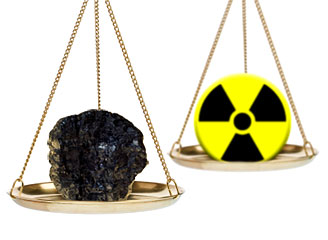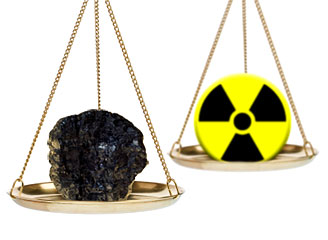Last week, news broke that regional power consortium Energy Northwest may be looking to build another nuclear reactor in Washington state.
The last time Energy Northwest went after nuclear power, they were known as Washington Public Power Supply System — or WPPSS, which eventually came to be pronounced as “whoops” when only one of five proposed plants was completed (the Columbia Generating Station operating on the Hanford Nuclear Site), causing one of the largest municipal bond defaults in U.S. history.
 So why revisit this issue some three decades later? Energy Northwest is seeking the golden ticket that is carbon-free electricity generation; they already utilize solar, wind, and biomass sources but are now looking at other options. Nuclear power is certainly one of those options, but it doesn’t come without risk, says Robert Alvarez, director of the Nuclear Policy Project at the Institute for Policy Studies in Washington, D.C.
So why revisit this issue some three decades later? Energy Northwest is seeking the golden ticket that is carbon-free electricity generation; they already utilize solar, wind, and biomass sources but are now looking at other options. Nuclear power is certainly one of those options, but it doesn’t come without risk, says Robert Alvarez, director of the Nuclear Policy Project at the Institute for Policy Studies in Washington, D.C.
And Alvarez would know. After serving as senior policy adviser to the U.S. Secretary of Energy during the Clinton administration, he and his colleagues published a report in 2003 detailing the vulnerabilities of spent fuel pools at nuclear power plants across the country.
Alvarez is in Seattle this week as a guest of the Washington Physicians for Social Responsibility; he’ll be giving a free talk at Town Hall Wednesday night on “Energy and Weapons in 2009: How do we assure a sustainable, nuclear-free future?” I took the opportunity to ask him about the Energy Northwest project and the ways it could affect local citizens.
Q. You’re here in Seattle to talk about the need for a nuke-free future. What are the issues at stake here in Washington state?
A. You basically have three main issues. You have a lot of nuclear weapons stationed at Puget Sound and what will happen in terms of future arms reductions is going to have an impact on that. You’ve got the Hanford Nuclear Reservation, which stopped making materials for nuclear weapons 20 years ago and has left behind a very large, daunting mess that needs to be cleaned up. And now you have talk of perhaps building new nuclear power plants by Energy Northwest.
Q. If Energy Northwest was to build a new nuclear power plant, what would be the dangers there?
A. The dangers, if you want to put it in those terms, would be of an economic nature. The fact of the matter is that even before the collapse of Wall Street and the financial services industry, they had pretty much made it clear that they weren’t going to take any risks in financing nuclear power plants and that’s the way it’s been for some 30 years. So if Energy Northwest decides to proceed to build and operate a new nuclear power plant, they’re going to have to rely on the taxpayer and the ratepayer to bear all the risk of this operation.
The other issue is that since the Obama administration is effectively taking the Yucca Mountain disposal site off the table, the Columbia Generating Station and all the nuclear power plants in the United States — all 103 of them — are facing the prospect of having to store these wastes on site for the indefinite future. So the waste problem is not really being solved — it’s just there.
The additional issue I have with nuclear power plants is that the way spent fuel is stored at these reactors is not, I think, acceptable in this day and age where we can be targets of terrorist attacks … [My colleagues and I] pointed out that if the terrorist were to cause the water to drain from these pools, it could lead to a catastrophic fire [that would] release radiation over the landscape and create an area of severe contamination that would render an area uninhabitable for hundreds of years; it would be substantially larger than the radiation control zone created by the Chernobyl accident.
Q. What cities would be affected?
A. This would be the Tri-Cities area. We raised this issue because there are definitely safer ways of storing spent fuel at reactors and whether you’re for or against nuclear power plants, there’s no reason to have this stuff stored the way it is right now. The whole idea behind dense compaction was that it would be suitable until Yucca Mountain was opened. So now it’s time to be thinking more seriously about the prospects of the spent fuel staying at these sites for several decades and storing it in the safest, most secure way possible.
Q. What are your thoughts on nuclear power as a carbon-free alternative?
A. I think we have tended to look at nuclear power in a very narrow way, like “gee whiz, it’s here, we can generate electricity and we don’t have to generate all these greenhouse gases.” But there are other issues here that you have to consider when you make that decision [to build a nuclear power plant]; if you don’t, this can turn into something a lot more serious and more regrettable.
Q. During your talk at Town Hall, what will be your message to the citizens of Washington state?
A. Be aware that if a decision is made to proceed with a nuclear power plant, the citizens of Washington state, as ratepayers and taxpayers, are going to bear the complete risk of this plant — financial and any other risk. Is that how you want to generate electricity? The other message is that there’s already a very large mess created, and we have to really start to pay attention … to the Hanford Site — there’s a lot more work that has to be done out there. The third issue is we need to really work hard to hold President Obama to his pledge to transform our energy future.



